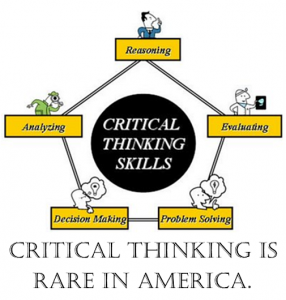Developing and Sustaining Thought Deprivation (Part 1)

25 February 2019
There is a dangerous, but tremendously effective, political approach being employed in America. It could be called “Thought Deprivation”. That is, conditioning people so that they do not think with depth regarding the issues that face us as a nation. Sadly, allowing this “Thought Deprivation” approach to become routine and embedded in the political process has brought us to a point of real danger in the governing, and very survival, of this nation. Many actions that should reasonably be taken are not taken. Other actions are taken that adversely impact the well-being of Americans. Finally, gridlock is a frequent consequence of this political approach; nothing is done regarding important matters affecting the people of our country.
The examples of how politicians and political practitioners use “thought deprivation” to win elections and wield power seem endless. A prime example shows in the substantial support that Democrats are generating for Medicare-for-All. In a future column, I will explain my contention that the support being voiced by citizens is, in great part, the result of expertly executed “thought deprivation”. In this column, and others leading up to the examination of support for Medicare-for-All, I will discuss my observations regarding the process by which “thought deprivation” is developed and sustained.
My observations as to how “thought deprivation” is developed and sustained in a person, by others, can be summarized as follows:
- Tremendously lessen, if not demolish, the capacity for critical thinking.
- Lead citizens to focus on identify as members of a group based on race, ethnicity, economic standing, religious affiliation, etc.
- Promote tension between groups or groups of groups.
- Contend that some groups are victimized, mistreated, discriminated against, etc.
- Convince a target group, or groups, that they are entitled to certain benefits.
- Promise to deliver the benefits to which people have been convinced they are entitled.
- When the promised benefits do not materialize, blame others.
The opening step of lessening or demolishing the capacity for critical thinking might seem to be an exaggeration. However, consider the meaning of critical thought as it appears at https://www.criticalthinking.org/pages/defining-critical-thinking/766:
Critical thinking is the intellectually disciplined process of actively and skillfully conceptualizing, applying, analyzing, synthesizing, and/or evaluating information gathered from, or generated by, observation, experience, reflection, reasoning, or communication, as a guide to belief and action.
Pause for a moment and mentally list the times in the last month when you, in media, in political speech or conversation, in social media, observed what is defined above as “critical thinking”. My guess is that your list is very short or without any entries at all. I do not post very often on Facebook, but do read the posts of other people. I am amazed and saddened by the scarcity of critical thinking that is present in most posts. There are mostly emotionally-driven rants that present no facts or thoughtful analysis of whatever topic is being discussed. This is especially true where political or social issues are addressed.
Another section of the information presented at www.criticalthinking.org (referenced above) provides a possible explanation as to why critical thinking might be so scarce in American society:
Critical thinking varies according to the motivation underlying it. When grounded in selfish motives, it is often manifested in the skillful manipulation of ideas in service of one’s own, or one’s groups’, vested interest. As such it is typically intellectually flawed, however pragmatically successful it might be.
I contend that we have become a nation where selfishness is disavowed as a general condition of our society, but our overall conduct cries “selfishness”. In this atmosphere, the truth of the quote above shows through. The thinking that happens, limited as it might be, is too often intellectually flawed. That is the case because individuals and groups are encouraged to focus on what is good for them, without considering the impact on others; even further, serious collection and examination of facts and the honest defining, and consideration of outcomes hardly ever happen.
My comments to this point might leave the impression that what I am describing only applies to the general public. That is not the case. This “thought deprivation” condition is very much present in the American political class, in politicians. If you doubt that to be true, watch some congressional hearings or listen to some politicians as they address challenging issues during televised interviews. There is hardly ever a sliver of genuine critical thought. Their failure to model critical thought contributes to the scarcity of it in the general population.
With critical thinking lessened or demolished in individuals, the next step is rather easy to accomplish. That is, leading citizens to identify as members of a group based on race, ethnicity, economic standing, religious affiliation, etc. When there is little or no focus on facts, and thoughtful analysis of facts, people do what is natural. An article by Nayef Al-Rodhan titled, “Divisive Politics and the Brain: Primordial Determinism vs. Responsible Egalitarianism”, speaks to our natural response process regarding identifying with a group. In part, he writes:
Furthermore, the urgency to barricade oneself against ‘others’ – immigrants, ethnic and religious minorities, etc. – stems from ancestral predispositions that associate belonging to one’s tribe or group as critical to survival . Using non-invasive methods, neuroscientists have identified that the neurocircuitry of tribal behavior that separates “us” from “them” occurs in the prefrontal cortex. Without much reflexivity, and within 170 thousandths of a second from the moment we first see them, we already distinguish between members of the in-group and those of the out-group. Our brains have inherited this hardwiring from our ancestors, but there is another interesting fact.
While this basic bias is subconsciously formed, our exact definition of what constitutes “us” and “them” is learned. We may be hardwired to distinguish between us and others, but the actual definition of the other is not internally hardwired; it is something we are socialized into throughout our lives.
I hold that what Professor Al-Rodhan explains addresses our natural tendency of identifying with groups and separating ourselves from other groups. The critical piece of the process is in deciding which group, or groups, we identify with and which ones we see as separate and apart from us. Those “separate and apart groups” constitute “them” and are normally people who are treated as the enemy. Our defining of “them” is, based on Al-Rodhan’s explanation and my observations across many years, the result of socialization; socialization being the process of learning to behave in a way that is acceptable to society.
Therein is the great challenge: individuals needing to make choices that produce fair and positive outcomes even while having one’s “us” and “them” defined by a person’s dominant societal influences. Given that we live in a country, even a world, where critical thinking is very rare, individuals and groups easily influence peoples’ thinking in ways that adversely affect individuals, their primary group, and even society in general. It is in this atmosphere, under these conditions, that politicians, joined by politically active individuals and groups, are able to manipulate citizens for political gain.
Next time, more on steps to developing and sustaining thought deprivation.




